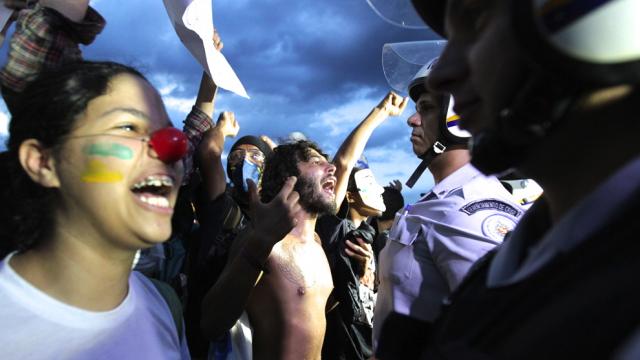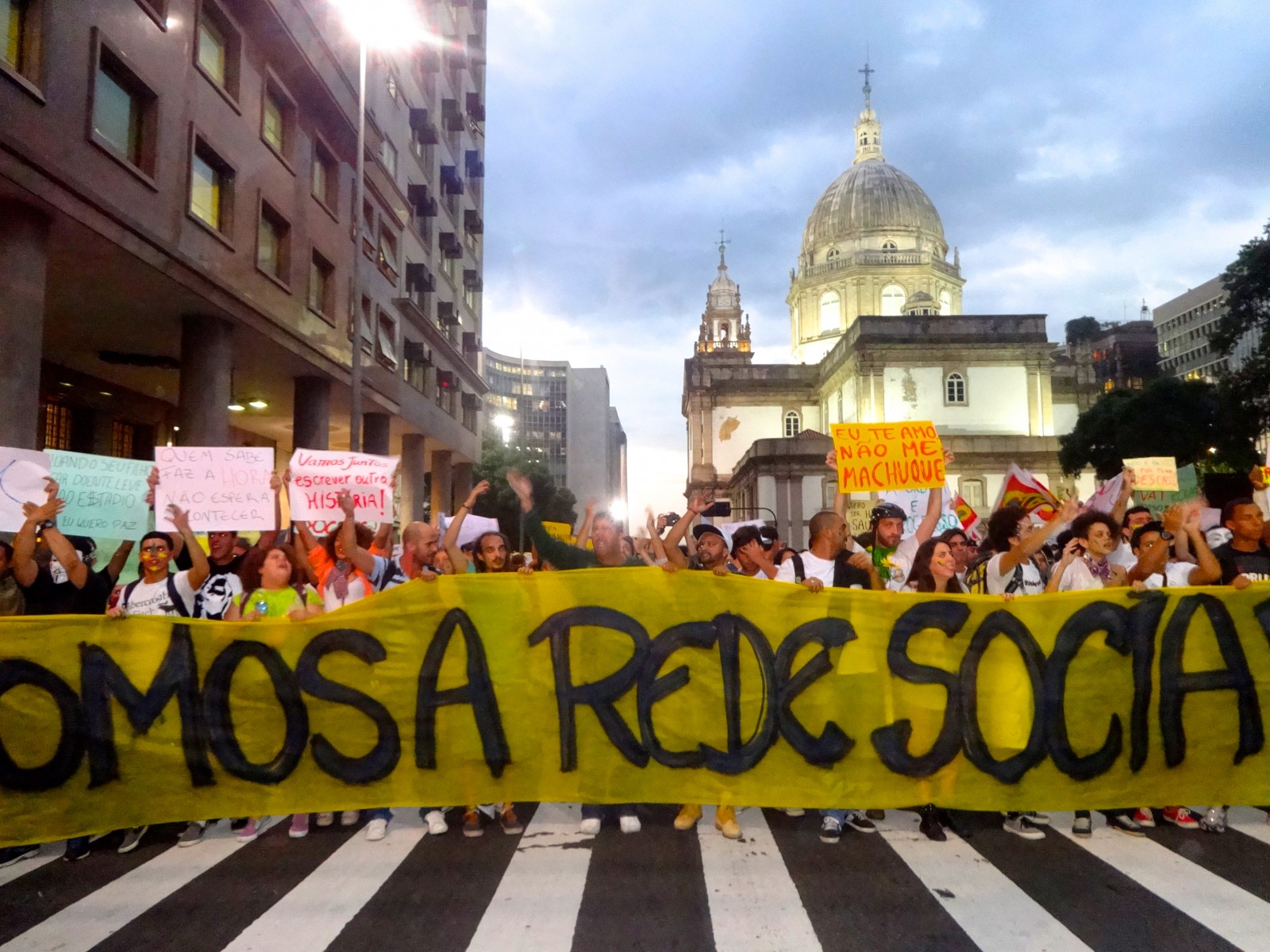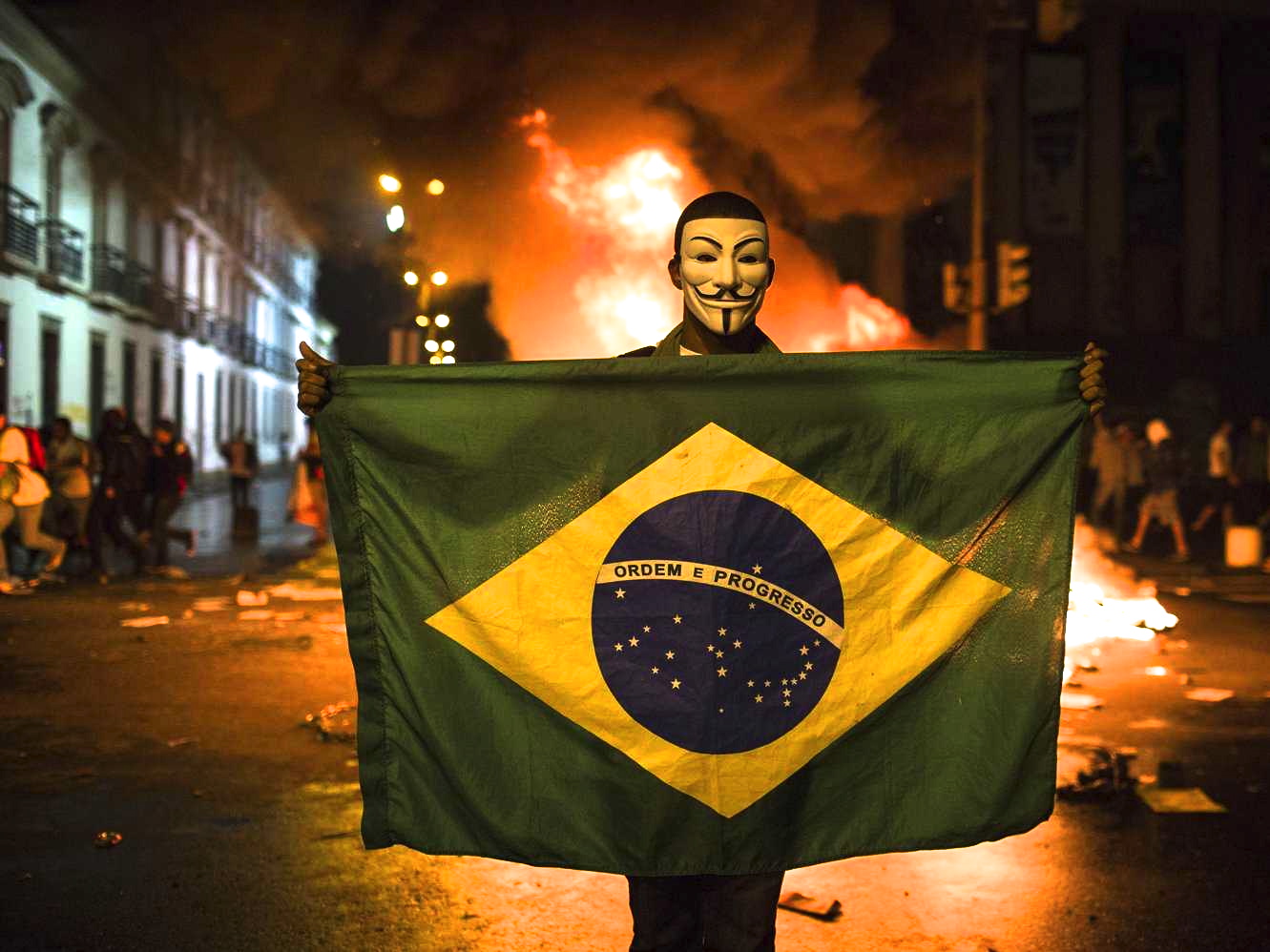
In June, Brazil faced a lot of demonstrations for a few weeks. Once the bus fares rose, people in many cities stood up to ensure that another abusive increase would not be instituted again. The brutal police repression of the protests only called more attention to them, and turned the course of national debate. Moreover, the protests have gotten bigger and spread across entire regions, no longer restricted to the central urban areas where they erupted.
Although they were essential to repeal the fare increase, it is important to highlight that the protests became very different as they grew. Many right wing people also came out on the streets and a nationalist discourse gained force. While the right wing forces couldn't overwhelm the protests, their emergence nonetheless revealed the demonstrations’ uncertain path. Since the peak outrage in June, we are still living with a feeling of protest though it isn't clear what the heritage of these protests has become. In a word, everything is still confused.
Last month, September 7 marked Brazili's Independence Day. Included here were the annual “Shout of the Excluded” marches staged by traditional social movements and leftist political parties. But this year, we also had a call by Anonymous Brasil. Although the Anonymous groups have been very important in recent American and European mobilizations, their outlines in Brazil are not that clear.
While the group here is fiercely anti-partisan, it usually calls attention to corruption as if it were the most important problem facing the country. Because of this, Anonymous Brasil’s claims are very close to the conservative discourse, and they have already been accused as a masked representation of right wing forces. At the same time, Anonymous has also been the target of corporate media and government attacks, and is sometimes associated with the Black Bloc.
Since the anti-corruption discourse right now is very strong in Brazil, many conservative middle-class people waged abstract accusations against the government during the September 7 marches, the very same way they did during June. It is important to note that these “middle class” claims were not all shaped by Anonymous’s call to action. With the Internet, people can simply organize a march on their own. And consequently, in many cities there was an autonomous organization that launched the demonstrations, though it does not mean they carried out their marches and demands in a liberal or leftist tone.
Fortunately, the right wing forces on the streets that day were not alone. While "Shout of the Excluded" participants organized very weak protests some years ago — for a long time they were the only mobilization on Independence Day — those traditional marches got stronger this year, encouraged by the protest results in June. There were also other marches led by leftist motivations, and the leaderlessness and/or unclear leadership was again prominent among them.
It is also important to note that a few days before the September protests, the state government of Rio de Janeiro prohibited the use of masks during the rallies, threatening to identify and arrest all those wearing them or simply anyone covering their face. As a result, many other city and state governments also considered arresting masked people. The main target was the Black Bloc, which is being strongly accused here of promoting “violent acts” and has taken on the role of “enemy of democracy” in the eyes of Brazil's corporate media.
In addition, administrators of Facebook pages for Black Bloc and Anonymous Brasil were also detained some days before September 7, and were referenced as the “leaders” of the “movement.” For this reason, many people went to the streets to oppose the criminalization of social movements and to demand the basic right to protest.
As soon as such prohibitions took place, many supportive expressions emerged. For example, there was a picture of Caetano Veloso, Chico Buarque and other important artists with their heads wrapped in black scarves, showing their support for the Black Bloc. Ever since the Black Bloc became a relevant actor in the Brazilian demonstrations and received attention in the news, it has been attacked not only by government and media institutions, but has also weathered criticism from some leftist parties and liberal intellectuals who have accused the group of leading improper and confusing tactics to confront capitalism — and even being an authoritarian initiative in itself.
The Black Bloc in Brazil is badly trying to explain to the public that it is not exactly a movement, but rather a strategy. Such strategic and organizational modes of action are new in Brazil's political landscape, much as the anti globalization and global justice-oriented movement has had a less strong influence here, in contrast to the American and European scenes. In this sense, the Black Bloc can be viewed as representing something of a transitional moment: the emergence of a new political actor.
Nevertheless, the direct actions launched by the Black Bloc have not turned into an organic element of collective construction, but rather reflect images of property destruction that face strong resistance among many people – even from some deeply engaged since the “June journeys” – and are therefore isolated from debates promoted by liberal or leftist forces. Indeed, property destruction here has also resulted in people seeking to appropriate private goods for themselves, since some of these people are very poor, it is posing a real challenge to the broader “movement.”
In the aftermath of the September 7 protests, it is again noticeable how the political debate has spread more generally, and is still echoing all over the country. But since the peak of the protests in June, the left has not built a real alliance or established a dialogue with non-conservative parts of the middle class, which remains dissatisfied and yearns for true change. This scenario likely contributed to the violent state repression that emerged in June and became smaller, though clearly exposed, last month.
Protests against police violence, which became overtly aggressive in June, were also evident in the September 7 marches. In particular, the very poor population across many cities has begun to rebel, revealing how police have been treating them for a long time, prior to the summer uprising. Now more than ever, the systematic violation of human rights by Brazilian police is being widely recognized.
Following violent clashes, injuries and arrests on September 7 in all of Brazil's major cities, police actions have come under more scrutiny and provoked debates among different social classes and groups, especially in Rio. Political organizers and others have emphasized the violent actions and crimes by military police — the most featured case being Amarildo Dias de Souza, who went missing, and became a symbol of the struggle against police violence in the suburbs. Amarildo was a bricklayer from Rocinha, the largest favela of Rio de Janeiro, and was last seen on July 14 when he was carried in a police vehicle for alleged investigation.
Once he was declared missing by his family, a “Where is Amarildo?” campaign began. But neither police nor the Rio government answered the claims. Just one of the many unexplained disappearances of poor people, especially, the phrase “Where is Amarildo?” now echoes through the streets and on the Internet in a campaign that is gathering many political groups and organizations behind it. More than anything, the Amarildo case has shown how deeply poverty in Brazil is controlled by authorities, and reflects the public's growing questioning of police legitimacy, especially in Rio.
3 WAYS TO SHOW YOUR SUPPORT
- Log in to post comments















